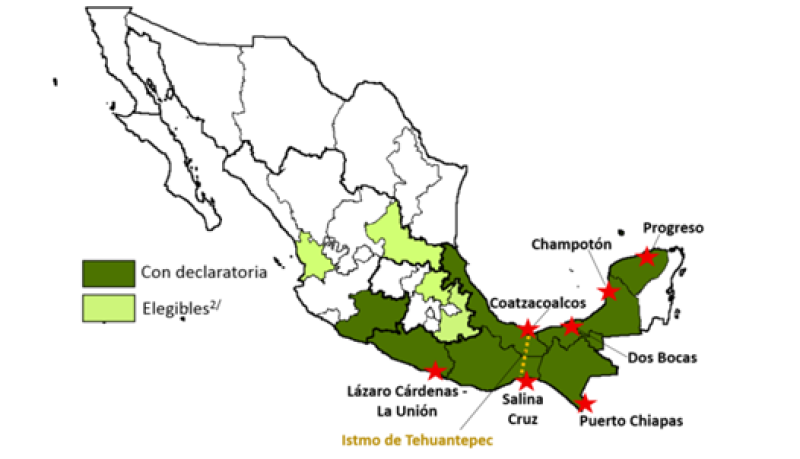

Puerto Chiapas
Coatzacoalcos
Lázaro Cárdenas – La Unión
Progreso
Salina Cruz
Dos Bocas
Champotón.
As stated in the October 11 2017 newsletter, SEZs are geographically defined areas with natural and logistical advantages. This allows them to be turned into highly productive areas offering business opportunities to investors drawn to the government's tax benefits.
The tax benefits applicable in the SEZs include:
Exemption of income tax for the first 10 years;
Fifty percent reduction of income tax for the next five years;
Zero percent value-added tax (VAT) when acquiring goods for use in the SEZs;
Zero percent VAT on services rendered to an Investor; and
Goods imported to Mexico to be used exclusively in the SEZs are not treated as imports.
Activities that may be performed in a SEZ include manufacturing; agribusiness; processing, transformation and storage of feedstock and materials; scientific and technological innovation and development; and provision of support services to productive economic activities such as logistics, financial services, informatics and professional services, as well as the introduction of goods for such purposes. These SEZ benefits do not apply to any businesses related to hydrocarbons.
While some of the decrees were published last year, no permissions for exploiting a SEZ have yet been granted. However, the government expects to grant at least one permission by the end of the year. The government is encouraging both Mexican and foreign investors to move their operations to the SEZs. To do so, permission for operating in the SEZs needs to be obtained through public bids.
Despite all the benefits that these regions offer, potential investors have expressed concerns about the continuity of the decrees, as in December 2018 the new political party, Morena, will take power and control the congress. However, party officials have stated on many occasions that the SEZs are important for the country, and the party is not expected to decrease the benefits offered in the decree. Rather, they have said that they will continue encouraging investors to conduct business within these areas in order to develop them.
On September 13 2018, a licenses and permissions committee was established to bring certainty and transparency to the process of assigning the SEZs. The committee was formed by the Federal Authority for the Development of Special Economic Zones’ executive secretary, and promotion and investment personnel and will give their opinion regarding the necessary conditions to grant a license or permit, as well as being in charge of public bids.
The committee is expected to underline Mexico's commitment to creating, maintaining and promoting the SEZs, as it depends directly on the federal authorities to develop the SEZs. Therefore, even if the new government retracts what it has already stated about continuing to encourage investment in the SEZs, the development plan is covered by federal law and national authorities.
The benefits that the SEZs bring to companies are quite appealing, and there are many regions that may be of interest to investors seeking to develop long-term business in Mexico.
This article was written by Santiago Llano Zapatero and Alberto Anguiano Pineda of Ritch, Mueller, Heather y Nicolau, SC.
Santiago Llano Zapatero (sllano@ritch.com.mx)
Alberto Anguiano Pineda (aanguiano@ritch.com.mx)
Ritch, Mueller, Heather y Nicolau, S.C.











